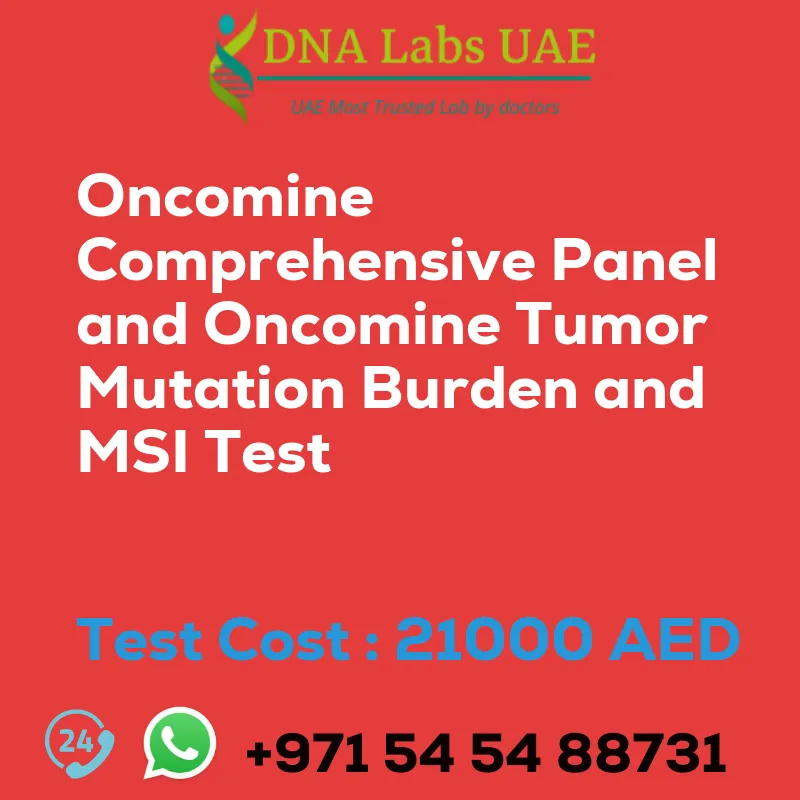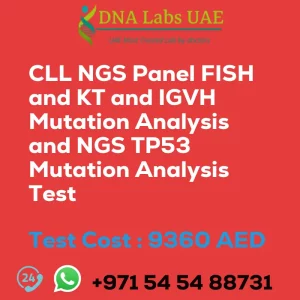Oncomine Comprehensive Panel and Oncomine Tumor Mutation Burden and MSI Test
Are you looking for advanced genetic testing options to diagnose and treat cancer? DNA Labs UAE offers the Oncomine Comprehensive Panel and Oncomine Tumor Mutation Burden and MSI Test. In this blog, we will provide detailed information about these tests, including their components, cost, sample condition, report delivery, method, test type, and more.
Test Name: Oncomine Comprehensive Panel and Oncomine Tumor Mutation Burden and MSI Test
Components
The test requires paraffin embedded tissue blocks and EDTA Vacutainer (3 ml) as components.
Price
The cost of the Oncomine Comprehensive Panel and Oncomine Tumor Mutation Burden and MSI Test is 21000.0 AED.
Sample Condition
The sample condition for this test includes tumor tissue and peripheral blood.
Report Delivery
The report for this test will be delivered within 2-3 weeks.
Method
The Oncomine Comprehensive Panel and Oncomine Tumor Mutation Burden and MSI Test utilize next-generation sequencing (NGS) and Sanger sequencing as the method of analysis.
Test Type
This test falls under the category of genetics.
Doctor
It is recommended to consult an oncologist for this test.
Test Department
The test can be performed in the genetics department of DNA Labs UAE.
Pre Test Information
Please note that a doctor’s prescription is required to undergo the Oncomine Comprehensive Panel and Oncomine Tumor Mutation Burden and MSI Test. However, the prescription is not applicable for surgery and pregnancy cases or individuals planning to travel abroad.
Test Details
The Oncomine Comprehensive Panel is a next-generation sequencing panel that analyzes over 500 cancer-related genes for mutations and alterations. It aims to identify potential targets for therapy and provide information on tumor heterogeneity.
The Oncomine Tumor Mutation Burden (TMB) test measures the number of mutations present in a tumor. High TMB has been associated with a better response to immunotherapy in certain cancers.
Microsatellite instability (MSI) is a type of genetic alteration that occurs when the DNA repair system is impaired. MSI is commonly seen in certain types of cancer, such as colorectal cancer, and serves as a biomarker for response to immunotherapy.
By combining the Oncomine Comprehensive Panel with Oncomine TMB and MSI testing, a more comprehensive picture of a patient’s cancer can be obtained, helping guide treatment decisions. This information can be used to identify potential targets for therapy, predict response to immunotherapy, and monitor disease progression.
Don’t wait, consult with an oncologist and get the Oncomine Comprehensive Panel and Oncomine Tumor Mutation Burden and MSI Test done at DNA Labs UAE to gain valuable insights into your cancer and improve your treatment outcomes.
| Test Name | Oncomine Comprehensive Panel and Oncomine Tumor mutation burden and MSI Test |
|---|---|
| Components | Paraffin embedded tissue blocks + EDTA Vacutainer (3 ml) |
| Price | 21000.0 AED |
| Sample Condition | Tumor tissue + Peripheral Blood |
| Report Delivery | 2-3 weeks |
| Method | NGS + Sanger Sequencing |
| Test type | Genetics |
| Doctor | Oncology |
| Test Department: | |
| Pre Test Information | Oncomine Comprehensive Panel + Oncomine Tumor mutation burden + MSI can be done with a Doctors prescription. Prescription is not applicable for surgery and pregnancy cases or people planing to travel abroad. |
| Test Details |
Oncomine Comprehensive Panel is a next-generation sequencing panel that analyzes over 500 cancer-related genes for mutations and alterations. It is designed to identify potential targets for therapy and provide information on tumor heterogeneity. Oncomine Tumor mutation burden (TMB) is a measure of the number of mutations present in a tumor. High TMB has been associated with better response to immunotherapy in certain cancers. Microsatellite instability (MSI) is a type of genetic alteration that occurs when the DNA repair system is impaired. MSI is commonly seen in certain types of cancer, such as colorectal cancer, and is a biomarker for response to immunotherapy. Combining Oncomine Comprehensive Panel with Oncomine TMB and MSI testing can provide a more comprehensive picture of a patient’s cancer and help guide treatment decisions. This information can be used to identify potential targets for therapy, predict response to immunotherapy, and monitor disease progression. |







